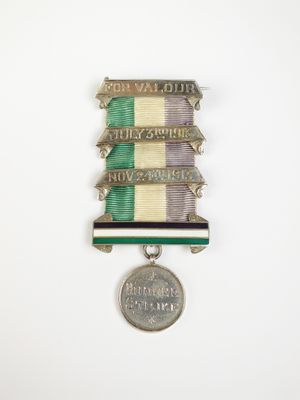Rare suffragette medal sells at Shrewsbury auction
A rare medal awarded to a suffragette who went on a hunger strike while in prison for an arson attack sold for £12,000 at an auction in Shrewsbury.

Clara Giveen is remembered for her part in the attack on Hurt Park grandstand in 1913 when she and the actress and suffragette, Kitty Marion, set fire to the racecourse in Surrey.
They were arrested the following morning and Giveen was sentenced to three years in prison and forcibly fed.
She was later released under the Cat and Mouse Act, and was given the Hunger Strike Suffragette Medal by the Women’s Social and Political Union (WSPU).
It was sold at Halls' October auction in Shrewsbury and caused a stir among bidders online and in the sale room.
Specialist valuer Derek Ainsworth said: "The interest in suffragette medals has been strong recently and we are delighted to have realised such a high price for this example.
"The medal was part of a probate and was owned by a Shropshire resident, near Ellesmere. I’ve never seen another like this and it is no surprise that there was so much interest."
Giveen joined the WSPU after being angered by the treatment of women at the Black Friday protect outside the Houses of Commons in 1910.
She and Marion planned their attack in retaliation for the death of Emily Wilding Davison, who died after being trampled by King George V’s horse during a protest in 1913.
The medal awarded to Giveen was engraved ‘Hunger Strike’ on the one side and had her name on the other.
The title ‘For Valour’ was engraved on a scrolled enamelled bar above two further enamelled bars carrying the dates July 3, 1913 and November 24, 1913.
However, most significant was the engraving on the reverse of the medal which read, ‘fed by force 1/3/12’.
Included in the lot was a small hammer brooch engraved ‘March 1912’, a suffragette enamelled prison badge and a ‘Union of Licensed Vehicle Workers’ badge.
Hammers were used by suffragettes including Giveen to break windows as part of the ‘Window Smashing Campaign’ in 1912 and those who were successful were awarded brooches to signify their bravery.
This year marks 100 years of women's suffrage. Finally in 1918, Parliament passed an act granting the vote to women over the age of 30 who were householders, the wives of householders, occupiers of property with an annual rent of £5, and graduates of British universities.




